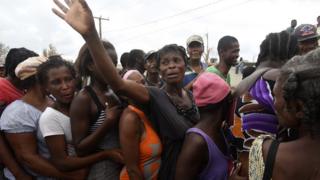Hurricane Matthew: ‘Massive response’ needed in Haiti, UN says
-
10 October 2016
- From the section Latin America & Caribbean
 Image copyright
Image copyright
Getty Images
In the most affected areas, people are in need of food, water and clothes
The UN secretary general has said that a “massive response” is needed to help Haiti recover from the devastation caused by Hurricane Matthew.
Some towns and villages had been wiped off the map and tensions were already mounting as people awaited help, Ban Ki-moon said.
The UN has also made an emergency appeal for nearly $120m (£97m) in aid.
The category-four storm is believed to have killed as many as 900 people in the Caribbean country.
Matthew, the strongest hurricane to hit the region in a decade, destroyed tens of thousands of homes in Haiti, leaving more than 60,000 people staying in temporary shelters.
“Hundreds have died; at least 1.4 million people need assistance at this time. Some towns and villages have been almost wiped off the map; crops and food reserves have been destroyed; at least 300 schools have been damaged,” Mr Ban said.
“Tensions are already mounting as people await help. A massive response is required.”
Officials said some people had started to put up blockades to try and stop aid convoys they saw driving through their areas without stopping.
An aid worker told the Associated Press news agency that a convoy carrying food, water and medications was attacked by gunmen in a remote valley where there had been a mudslide.
Image copyright
Getty Images
Many cases of cholera have been reported since Matthew hit parts of the country
Meanwhile, the UN humanitarian agency issued an appeal to help provide “life-saving assistance and protection” for 750,000 people in south-western Haiti over the next three months.
Officials were still struggling to reach the hardest-hit areas, the agency said, with communities in need of food, clean water and clothing.
There were growing fears that flooding could cause a cholera outbreak similar to that after the 2010 earthquake. The waterborne disease reached the island via Nepalese UN troops, causing the deaths of nearly 10,000 people.
Reports said a treatment centre in the town of Jeremie was overcrowded with not enough beds for patients, and some of them were being forced outside. Many of the cases involved children.
Other countries including France and the US have pledged to send aid. The Red Cross has launched an emergency appeal for $6.9m (£5.6m) and Unicef said it needed at least $5m to meet the immediate needs of 500,000 affected children.
Are you in any of the affected areas? You can share your experiences by emailing haveyoursay@bbc.co.uk.
Please include a contact number if you are willing to speak to a BBC journalist. You can also contact us in the following ways:
- Whatsapp: +44 7525 900971
- Send pictures/video to yourpics@bbc.co.uk
- Upload your pictures / video here
- Tweet: @BBC_HaveYourSay
- Send an SMS or MMS to +44 7624 800 100
Or use the form below
If you are happy to be contacted by a BBC journalist please leave a telephone number that we can
contact you on. In some cases a selection of your comments will be published, displaying your name as
you provide it and location, unless you state otherwise. Your contact details will never be published.
When sending us pictures, video or eyewitness accounts at no time should you endanger yourself or others,
take any unnecessary risks or infringe any laws. Please ensure you have read the terms and conditions.
